No Results Found
The page you requested could not be found. Try refining your search, or use the navigation above to locate the post.
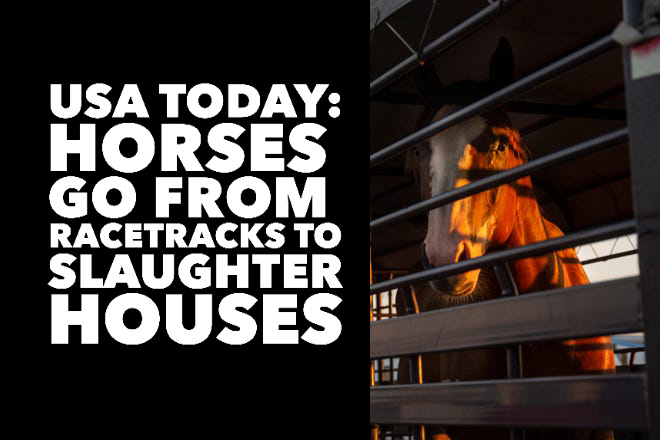
Re-post worthy article and VIDEO from USA TODAY.
FORNEY, Texas — Mike McBarron stepped out of the 96-degree heat and into a shed on his feedlot after loading 37 horses onto a truck. They were headed to Mexico, where they would be slaughtered and shipped around the world for human consumption.
“It’s just a job to me,” McBarron told USA TODAY Sports. “I mean, I don’t attach myself to them. I don’t fall in love with them.”
McBarron, 48, is one of the country’s most prolific “kill buyers,” people who buy horses and sell them to slaughterhouses. They also represent an uncomfortable reality for the horse racing industry.
Over the past decade, an average of more than 600 thoroughbreds a year have died because of racing, according to research by the USA TODAY Network.
By contrast, an estimated 7,500 thoroughbreds a year are slaughtered for human consumption, according to Alex Waldrop, president of the National Thoroughbred Racing Association (NTRA).
“The problem is that the entire industry is a conveyor belt for slaughter,’’ said John Holland, president of the Equine Welfare Alliance, a nonprofit organization dedicated to ending the slaughter of American horses. “They just keep cranking them (out).’’
McBarron, who acknowledged he has bought and sold retired racehorses for slaughter, has sent tens of thousands of horses to slaughter plants and generated millions of dollars in revenue, according to invoices cited in an informal investigation conducted by a nonprofit group called Animals’ Angels.
That practice is unlikely to be a popular topic this week at the Breeders’ Cup, which has attracted many of the sport’s top horses and intense scrutiny of the sport.
So what can you do to help stop this barbaric slaughter of race and other horses being slaughtered for human consumption?

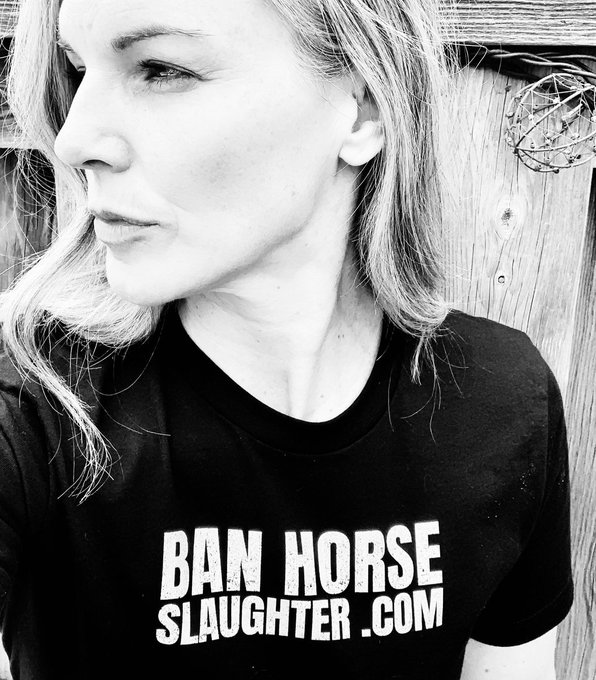
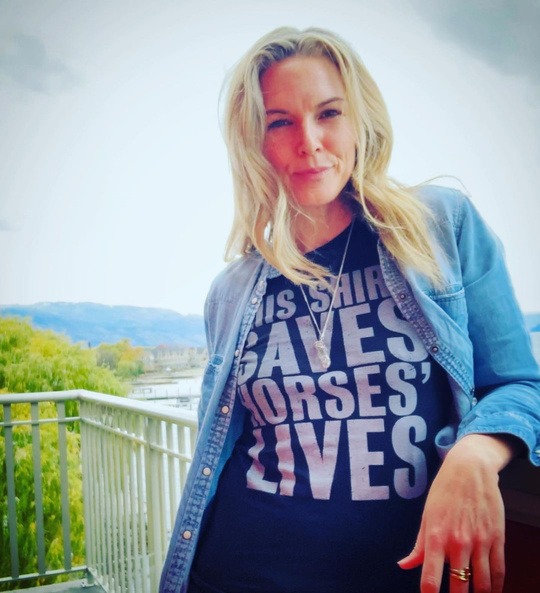
The page you requested could not be found. Try refining your search, or use the navigation above to locate the post.
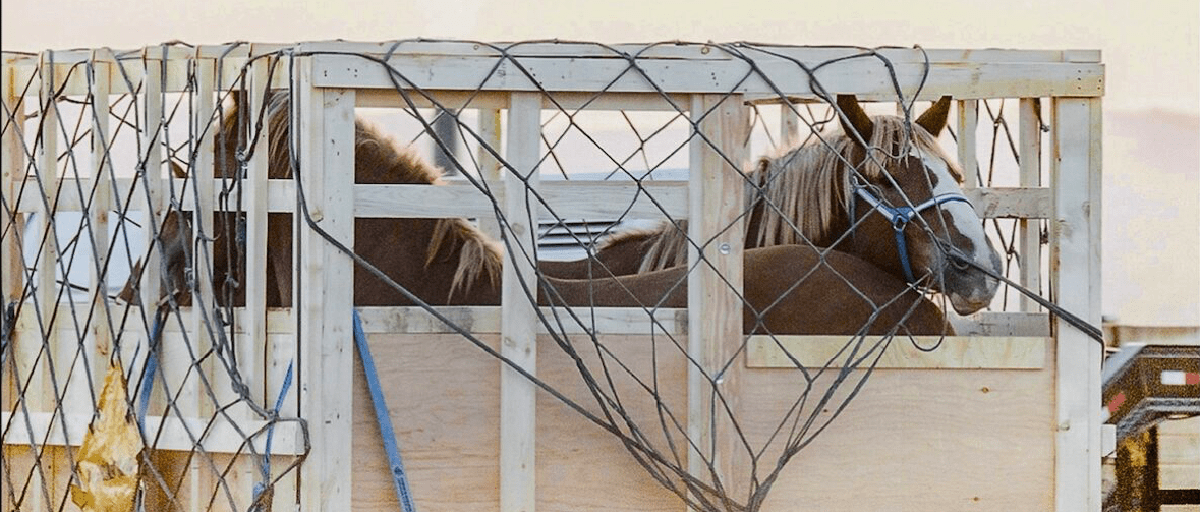
The Honourable Lawrence MacAulay, the current Minister of Agriculture and Agri-Food, has the power to end the inhumane export of horses by air for slaughter by enacting a regulatory amendment.
Help spread the word by sharing this email campaign with friends and family! You can also support the cause by donating—your contribution will help fund advertising efforts to raise awareness and push for change. Every action makes a difference!
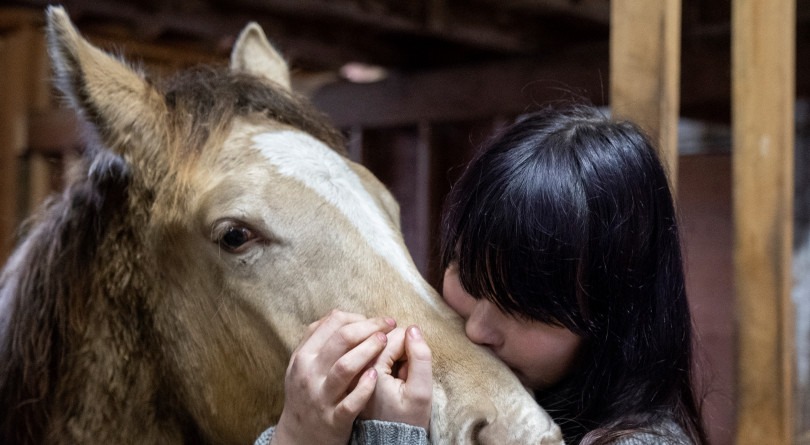
Photo by: Jen Osborne
“These activists are trying to change that.
The Canadian Horse Defence Coalition is waging a court battle to end Canada’s role as an exporter of live horses and frozen horsemeat for human consumption.”
Marie writes:
Thank you Canadian Horse Defence Coalition for all you do to help so many!
AND thank you to Maclean’s Canada for running this article to help raise awareness.
Canadians of courrse recognize Maclean’s magazine but for those reading from outside of Canada, this is a nationally recognized publication that was founded in 1905, and reports on Canadian issues such as politics, pop culture, and current events.
Mann had read the Canadian animal-health regulations which require horses over 14 hands high to be shipped solo in containers large enough to allow them to stand in a natural posture.
But she had routinely observed groups of three or four large horses being loaded into one crate with ceilings so low their ears poked through the top.
“There was no way they had enough room,” she says.
She condensed her footage into a three-minute YouTube video and in 2012 gave it to Sinikka Crosland at the Canadian Horse Defence Coalition, an animal rights group lobbying to stop the slaughter of horses.
Here, thought Crosland, was the perfect opportunity to raise awareness for their cause.
Photo at top of this post: A rescue farm in Duncan, Vancouver Island, holds horses that have avoided slaughter (Photograph by Jen Osborne)



The page you requested could not be found. Try refining your search, or use the navigation above to locate the post.

The Honourable Lawrence MacAulay, the current Minister of Agriculture and Agri-Food, has the power to end the inhumane export of horses by air for slaughter by enacting a regulatory amendment.
Help spread the word by sharing this email campaign with friends and family! You can also support the cause by donating—your contribution will help fund advertising efforts to raise awareness and push for change. Every action makes a difference!
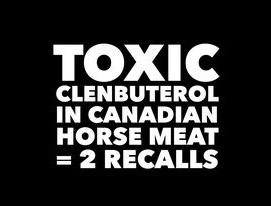
Okay, so you may be thinking to yourself, “But I don’t eat horse meat so what do I care if twice in the last 30 days, horse meat produced in Canada has been recalled due to being tainted with dangerous drugs, drugs that horses are routinely treated with that are not meant to enter the human food chain?”.
I hear you, and before I go any further you may want to keep in mind that in the summer of 2015, FOUR major news outlets in Canada reported that the Canadian Food Inspection Agency (CFIA) was NOT surprised that horse meat was ending up in Canadian supermarkets, but not marked as horse meat.
Oh and these types of recalls of drug tainted, toxic to humans horse meat have been going on for years.
AND
January 14th, 2020
Health Canada reports:
Viande Richelieu brand horse meat recalled due to presence of clenbuterol.
While some of the affected product may have been exported to other countries, this recall is for horse meat distributed in Quebec.
Clenbuterol is often used to treat horses with conditions such as Inflammatory Airway Disease and heaves. The administration of this drug is prohibited from use in animals that produce food or are intended for consumption as food.
This is yet another example of how the honor system when it comes to presenting horses to be slaughtered for human consumption is not working.

These kinds of recalls have been going on for years.
The page you requested could not be found. Try refining your search, or use the navigation above to locate the post.



The page you requested could not be found. Try refining your search, or use the navigation above to locate the post.

The Honourable Lawrence MacAulay, the current Minister of Agriculture and Agri-Food, has the power to end the inhumane export of horses by air for slaughter by enacting a regulatory amendment.
Help spread the word by sharing this email campaign with friends and family! You can also support the cause by donating—your contribution will help fund advertising efforts to raise awareness and push for change. Every action makes a difference!
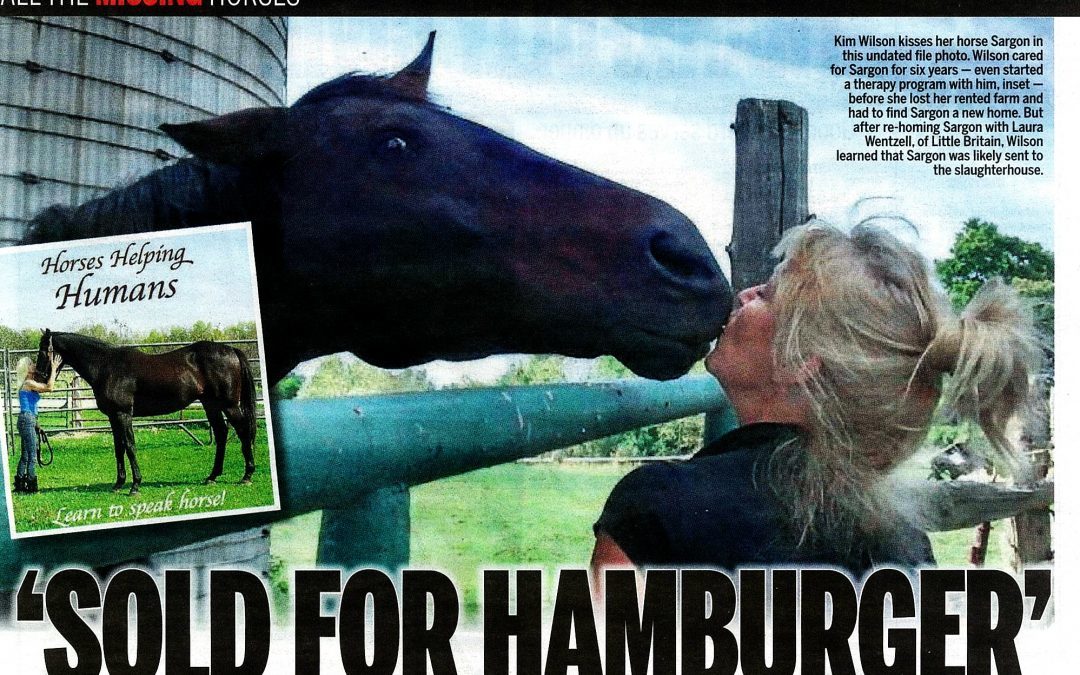
This story is definitely re-post worthy.
This story is a reminder to all of us in Canada who live within a days drive of where slaughter plants are in Alberta, or Quebec, about how easy it would be for any of our horses to be snatched and slaughtered before we even knew they were missing.
Think about how far you live from either Alberta or Quebec, a days drive, 2 days drive or less?
So this story is pertinent to those who live ANY where in Canada, but especially in the provinces of Alberta and Quebec and neighbouring provinces, like British Columbia and Ontario.
Every horse owner within Canada or the United States needs to be aware that any horse can be stolen and unless your horse is branded, there are not protocols in place at Canadian slaughter plants, to double check that a horse is stolen.
There are also not any mandatory hold times after a horse is sold to a slaughter plant so horses are often slaughtered the same day they arrive at a slaughter plant.
In other words, many Canadians could come home from work, or wake up in the morning to find that a horse or horses are missing, and our horses could be slaughtered for human consumption without us being notified first.
Slaughtering horses in Canada is legal.
The practice has been banned in the United States but horses from the United States are routinely shipped to Canada and Mexico to be slaughtered.
There have been other well documented cases of horses disappearing and being slaughtered.
Listen to Kim and Sargon’s story on Blue Sky Radio.
So what can you do to help bring this barbaric practice to a halt?




The page you requested could not be found. Try refining your search, or use the navigation above to locate the post.

The Honourable Lawrence MacAulay, the current Minister of Agriculture and Agri-Food, has the power to end the inhumane export of horses by air for slaughter by enacting a regulatory amendment.
Help spread the word by sharing this email campaign with friends and family! You can also support the cause by donating—your contribution will help fund advertising efforts to raise awareness and push for change. Every action makes a difference!
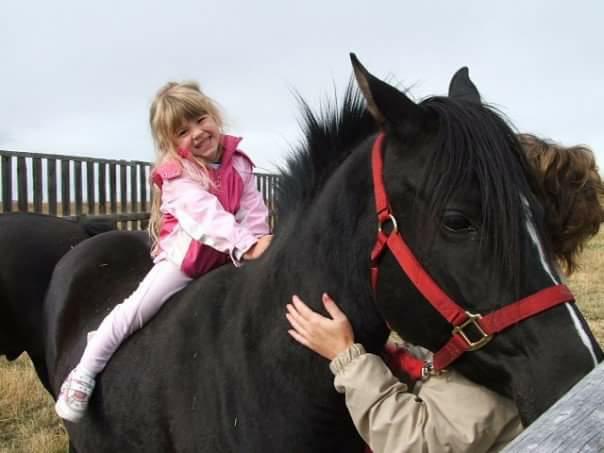
“They were family”. Woman horrified to learn 2 horses were stolen and sold to be slaughtered for human consumption.
Read the full story at CTV
Kathy O’Reilly says she still feels numb after learning from RCMP Monday that her two beloved horses — reported missing over the weekend — were stolen, shipped to a nearby slaughterhouse and slaughtered for human consumption.
Read the full story in the Calgary Herald.
PLEASE NOTE: Slaughtering horses for human consumption is no longer legal within the United States but horses from the United States are routinely shipped to Canada and to Mexico to be slaughtered for that purpose.
Some of the horse meat is consumed in Canada and much of it is shipped to other markets including the European Union, Japan, South Korea and China.
Unless your horse has an easily visible brand there is NO requirement on the part of the slaughter houses in Canada to double check that a horse that is being sold to them, does indeed legally belong to the person selling them the horse.
In addition there is NOT a mandatory hold time after a horse has been sold to a slaughter plant so horses are often slaughtered the same day they arrive at the plant.
In other words, there are those whose horses have been slaughtered before they even realize that their horses have been stolen.
Many Canadians live within an easy drive of a slaughter plant in Alberta or Quebec, and could easily wake up to realize that their horse, or horses are missing, or come home from a long day at work, and by the time they realize that their horse has been stolen, their horse or horses could already be slaughtered.
As you peruse other Blog posts on this site, you’ll learn this is NOT an isolated case.



The page you requested could not be found. Try refining your search, or use the navigation above to locate the post.

The Honourable Lawrence MacAulay, the current Minister of Agriculture and Agri-Food, has the power to end the inhumane export of horses by air for slaughter by enacting a regulatory amendment.
Help spread the word by sharing this email campaign with friends and family! You can also support the cause by donating—your contribution will help fund advertising efforts to raise awareness and push for change. Every action makes a difference!
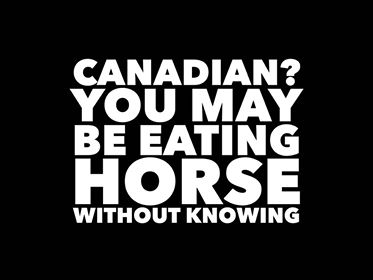
This blog post is worthy of a re-post. You may also be interested in Happy Canada (Slaughters Horses) Day as well.
Beware, summer BBQ-ers: there could be horse meat in your pork sausage. Or pork in your beef sausage. Or beef in your chicken sausage. Or chicken (and only chicken) in your turkey sausage.
Those are some of the examples cited in a new study from researchers at the University of Guelph, which found 20 per cent of sausages sampled from Canadian grocery stores contained meats that were not on the label. The study was commissioned by the Canadian Food Inspection Agency, which, according to the Canadian Press, was “not surprised” by the results.
Read the full story in Maclean’s https://www.macleans.ca/news/canada/should-you-be-surprised-if-theres-horse-meat-in-your-pork-sausage/
Scientist calls degree of off-label ingredients alarming.
A federally funded study has found that 20 per cent of sausages sampled from grocery stores across Canada contained meats that weren’t on the label.
The study, published this week in the journal Food Control, was conducted by researchers at the University of Guelph and commissioned by the Canadian Food Inspection Agency.
It examined 100 sausages that were labelled as containing just one ingredient — beef, pork, chicken or turkey.
“About one in five of the sausages we tested had some off-label ingredients in them, which is alarming,” said Robert Hanner, lead author of the study and an associate professor with the Biodiversity Institute of Ontario at the University of Guelph.
A study commissioned by the Canadian Food Inspection Agency has found that some sausages contain meats that isn’t listed on the label.
Researchers from the University of Guelph examined 100 sausages from grocery stores across Canada and found that one-in-five contained off-label ingredients, including horse meat.
Seven of 27 beef sausages examined in the study contained pork and one of 38 supposedly pure pork sausages contained horse meat.
Of 20 chicken sausages, four contained turkey and one had beef while five of the 15 turkey sausages studied contained no turkey at all — just chicken.
Lead study author Robert Hanner calls the results alarming.
He says researchers found that while beef sausages predominantly contain beef, some also have pork, which he says be of concern for kosher and halal consumers.
The food inspection agency says it’s not surprised about Hanner’s findings, but cautioned the study is small and it’s considering more research.
Read the full story at CTV.
A research team at University of Guelph pulled back the casing to find that products labelled as purely one meat — beef, pork, chicken or turkey — often contained other ingredients, including horse.
Associate Prof. Robert Hanner, of Guelph’s integrative biology department, said they’ve developed DNA-based methods to identify species — technology that’s been used in the past to expose global-level fraud in the seafood industry.
The Canadian Food Inspection Agency, in the wake of Europe’s horse meat scandal of 2013, wanted to know if the university’s researchers could do similar work for mixed meat, he said.
A deeper dive into grocery store sausage found that 20% of the samples — all labelled as containing one type of meat — actually were a mix.
Some “all-beef” sausages included pork, turkey sausages were made out of less-expensive ground chicken, and one pork sausage was mixed with horse meat.
Researchers didn’t look at other types of meat, but it’s possible that bison, lamb or other species might have made their way into the sausages, Hanner said.
“Our labelling laws require you to put what’s in the product on the label,” said Hanner. “For me, this just points to some gaps in our traceability system that some of this off-label meat is getting through.”
In a time of global supply chains, it’s even more important to be able to track down where this cross-species contamination might be happening, he said.
A consumer might have an allergy to one type of meat, and there are Kosher and Halal considerations.
“If this is happening farther up the supply chain, where some of their suppliers aren’t declaring what’s in there, could it be because some of this meat is unfit for human consumption?” Hanner said. “And that’s where I kind of worry — why isn’t it on the label?”
For instance, Brazil is in the midst of a food processing scandal where it’s alleged companies paid off inspectors to allow the use rotting meat.
Hanner said DNA technology offers an opportunity for Canada to become a world leader in offering safe and reliable food.
Sylvain Charlebois, professor of food distribution and policy at Dalhousie University, said processed meat and seafood are the most likely candidates for food fraud.
“With fish and seafood, there’s a huge mess there. It’s probably the worst category,” Charlebois said. “We did a study a few months ago and fish and seafood is by far the most problematic food category when it comes to food fraud because there are so many species, so much confusion.”
In Canada, 25% to 75% of fish could be mislabelled, he said.
As for sausages, Charlebois said he’s surprised the amount of unidentified meat was so low — in some parts of Europe, upwards of 50% of sausages contain mystery meat.
That doesn’t mean this is nothing to worry about though, he noted.
“Particularly for those who make dietary decisions based on faith. If you actually are buying a sausage with pork in it, and you’re from the Jewish faith or you’re a Muslim, that’s quite problematic. It doesn’t matter if it’s 25% or 100% — you’re misleading the public and therefore it’s fraud.”
Other common forms of food fraud are products that are labelled organic or local, Charlebois said.
Two high-profile Ontario cases involved grown-in-Mexico “local” tomatoes and falsely-labelled Kosher cheese.
Within 10-20 years, consumers should be able to access affordable devices either in their homes or at their local stores that can confirm the contents, Charlebois predicted.
Food regulators in Canada are also growing increasingly confident about pursuing bad apples, he said.
“As you see more and more fines, industry will actually clean up its act.”
Read the full story on the Toronto Sun website.

So why is eating horse meat any different than eating any other kind of meat?
That’s a great question.
One of the first concerns is that most of the horses slaughtered within Canada for human consumption, whether butchered and shipped to other markets or consumed within Canadian borders have not been raised for specifically for meat.
Horses that have been raced, or are considered pet horses are routinely slaughtered. Most horses that fit these categories will have been treated with wormers at least twice per year, wormers that have very clear protocols about their use on livestock entering the human food chain.
They may also have been treated with a drug commonly known as bute, that is administered for a wide range of ailments in horses, everything from arthritis to hoof abscesses and so much more.
Ask any horse owner they’ll be able to tell you all about how often they worm their horse and experience with bute.
But surely there’s paper work to be presented before a horse is slaughtered in Canada – right?
Well, you are absolutely right but that paperwork is on the honour system.
Do you want to trust your health to a system that is based on the honour system, especially when there have been cases where stolen horses have been slaughtered?



The page you requested could not be found. Try refining your search, or use the navigation above to locate the post.

The Honourable Lawrence MacAulay, the current Minister of Agriculture and Agri-Food, has the power to end the inhumane export of horses by air for slaughter by enacting a regulatory amendment.
Help spread the word by sharing this email campaign with friends and family! You can also support the cause by donating—your contribution will help fund advertising efforts to raise awareness and push for change. Every action makes a difference!